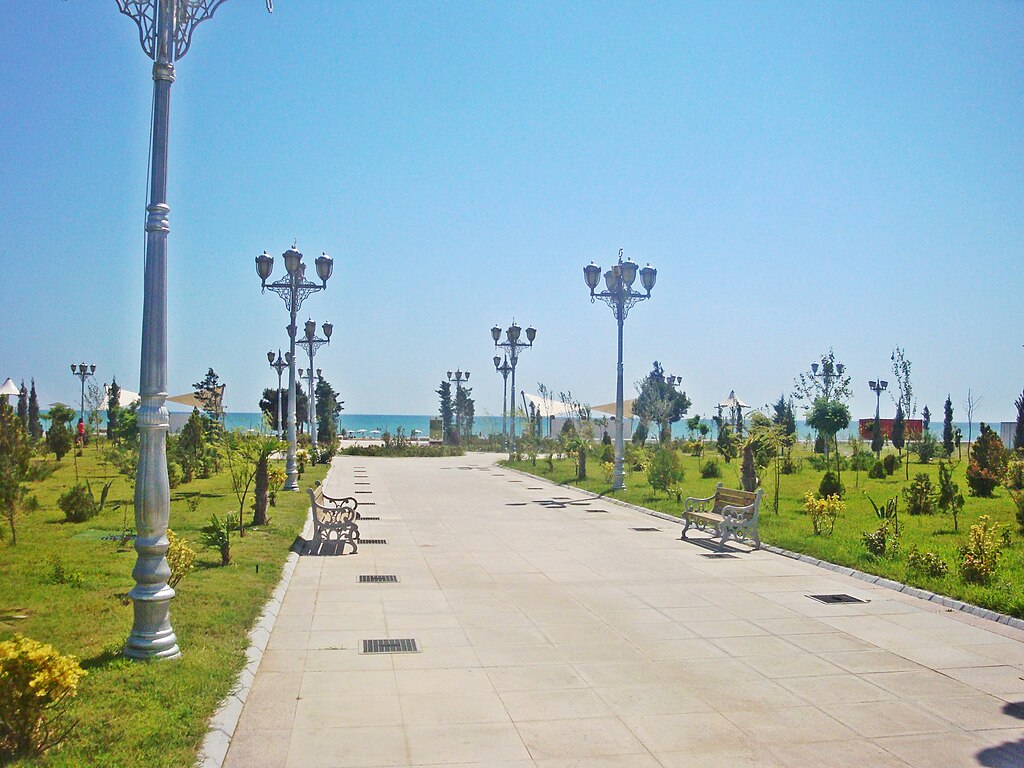Avaza, Turkmenistan's dry tourist beach
On the eastern shore of the Caspian Sea, just a few kilometres from the city of Turkmenbaši, five-star hotels, services of all kinds, an international airport and various entertainment, sports and catering facilities have been built. There really is everything, only now the sea is missing.
Ashgabat (AsiaNews) - The Avaza complex in Turkmenistan has been the jewel in the crown of the country's tourism industry for a few years now, with huge investments poured in between 2007 and 2017 to build a first-class resort on the eastern shore of the Caspian Sea, just a few kilometres from the city of Turkmenbaši, in the Balkan velayat.
Five-star hotels, services of all kinds, an international airport and various entertainment, sports and dining facilities: in Avaza there really is everything, only now the sea is missing.
The water level of the Caspian Sea has been dropping for many years, leaving the holidaymakers, who are often the big names in Turkmen politics and society, starting with President Serdar Berdymukhamedov himself, dry.
Where there used to be a beach, there is only a long stretch of sand, and to reach the water you have to walk several dozen metres, almost a mirage in the desert, and in any case the depth of the sea is no more than knee-deep, whereas until three years ago you could dive in completely.
One of the main causes is the reduced drainage of the Ural and Volga rivers, which are used to feed hydroelectric projects in Russia, as well as the increasingly evident decrease in rainfall. Rather than splashing in the waves, the Avaza holiday consists of long walks along the desiccated coastline, with a growing sense of melancholy.
Attempts are made to reorganise beaches away from the traditional shoreline, with transport services to reach what little water remains, and hotel swimming pools are expanded, but the quality of stay is still far from what is desired.
Turkmenistan has never disclosed the amount of money spent on the construction of the centre of Avaza, solemnly called a ‘national tourist zone’, and only a few luxury hotels have required an investment of between USD 40 and 50 million each.
The lowering of the waters has also damaged the functionality of the Turkmenbaši port itself, one of the country's newest, which was also renovated sparing no expense and opened with pomp and circumstance in 2018. Attempts are being made to excavate to lower the seabed around the port, sucking up sand with large hydraulic pumps, with very inefficient results.
The port is supposed to facilitate trade with Azerbaijan, and all along the way efforts are being made to preserve the necessary water depth, using various types of machinery and techniques, mostly imported from Russia, always at a high price, as specialists tell journalists from the various media, taking care to remain anonymous.
At the time of the port's opening, the authorities had announced that Turkmenbaši's capacity would reach 17 million tonnes of cargo and 300,000 passengers per year, but subsequently no statistics on the actual movement of goods and people were released.
The new port could have started a new relationship of Turkmenistan with other states, overcoming the traditional closures of regime policy, but for now one has to make do with the old, cramped port, two kilometres away from the new facility, which allows small sea excursions to holidaymakers in the area.
The inhabitants and workers of Avaza and Turkmenbaši doubt that their grandchildren will one day be able to see the Caspian Sea, and tourists will be forced to travel hundreds of kilometres to get their feet wet in the largest salt lake on earth, the ancient ‘sea of Hircan’ or ‘closed sea’ because of its extraordinary size, into which the great rivers of the Volga, Ural and Kura flow.
It is the true border between Europe and Asia, and between many different peoples of Russia, the Caucasus and Central Asia, which symbolically now becomes the desert that drives them apart and separates them.
Photo: Wikipedia / AltynAsyr
12/02/2016 15:14







.png)










